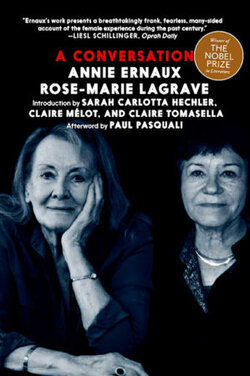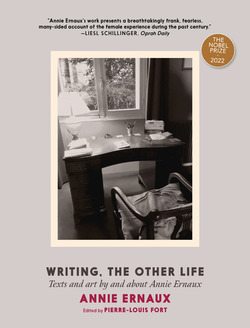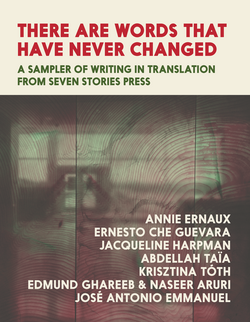WINNER OF THE NOBEL PRIZE IN LITERATURE 2022
Translated by Alison L. Strayer
"The Years is an earnest, fearless book, a Remembrance of Things Past for our age of media domination and consumerism, for our period of absolute commodity fetishism." —Edmund White
Winner of the 2019 Warwick Prize for Women in Translation
Shortlisted for the 2019 Man Booker International Prize
Winner of the 2018 French-American Foundation Translation Prize
Winner of the 2016 Strega European Prize
The Years is a personal narrative from Annie Ernaux of the period 1941 to 2006 told through the lens of memory, impressions past and present—even projections into the future—photos, books, songs, radio, television and decades of advertising, headlines, contrasted with intimate conflicts and writing notes from six decades of diaries. Local dialect, words of the times, slogans, brands and names for the ever-proliferating objects, are given voice here. The voice we recognize as the author's continually dissolves and re-emerges. Ernaux makes the passage of time palpable. Time itself, inexorable, narrates its own course, consigning all other narrators to anonymity. A new kind of autobiography emerges, at once subjective and impersonal, private and collective. On its 2008 publication in France, The Years came as a surprise. Though Ernaux had for years been hailed as a beloved, bestselling and award-winning author, The Years was in many ways a departure: both an intimate memoir "written" by entire generations, and a story of generations telling a very personal story. Like the generation before hers, the narrator eschews the "I" for the "we" (or "they," or "one") as if collective life were inextricably intertwined with a private life that in her parents' generation ceased to exist. She writes of her parents' generation (and could be writing of her own book): "From a common fund of hunger and fear, everything was told in the 'we' and impersonal pronouns."
Dear friends,
NAIBA (the North Atlantic Independent Booksellers Association) recently posted a very interesting declaration on its website—that no publisher should offer direct to consumers a discount greater than the discount at which it sells to bookstores. The average discount to bookstores is 46%. So, to me, this is a request that has to be taken seriously. Just as I would not ask all bookstores to stop selling greeting cards, postcards, used books, and other high-margin merchandise, most booksellers do understand that publishers need to build communities of readers online through a combination of discounting, creating original content, and good technology. Ending direct to consumer discounts of 50% and above seems to me to be an achievable first goal and a significant one. I applaud NAIBA for suggesting it.
Check out our two discounted themed collections celebrating Women in Translation Month and For Human Rights, Against War—the first running on our website from August 1st to August 8th, and the other from August 15th to 22nd—and the simultaneous month-of-August-long special promotion of these themed collections with participating bookstores.
We have finally left behind the age in which most authors considered themselves to be truly published only when one of their books was brought out by one of the five giant corporate houses. To be published by an indie was all very nice but in many authors’ minds it represented a kind of ghost-life in the shadows, without review attention, presence on store shelves, or even much word of mouth. But there is something happening now that’s different. For the first time, some are insisting on publication by smaller independent houses instead of by the big five. There is still the discrepancy in the amount of the advances. Smaller houses still cannot compete on that aspect. But in every other area they can. Last year at the Independent Publishers Caucus get-together at Winter Institute in Memphis, New York Times Book Review senior editor Greg Cowles insisted that it made no difference to him and his team whether a book was published in hardback or paperback when they consider its worthiness for being reviewed in the NYTBR. This is significant, since many independent publishers go straight to quality trade paperback editions, which are less expensive to print, less expensive for the consumer to buy, and live longer on bookstore shelves. Whereas most big publishers still bring out their big books in hardcover editions, which garner higher profits. Distribution has more or less equalized as well. Most booksellers don’t distinguish between books from large houses and books from smaller ones. But mostly, I think, what is happening is that the more the largest houses access, invest in, and harness technology, the harder it is for them to maintain the nourishing, highly personal relationships that must be the foundation for all successful author-publisher collaborations.
Last year, bestselling political author Naomi Klein brought out her new book with Haymarket, a small political house. And this year, when we brought award-winning Seven Stories memoirist Annie Ernaux two offers for the UK rights for The Years, including one from a large house that was exactly ten times the amount of the small independent house, she wrote to me that she had never had good experiences being published by larger houses, only by the small houses like Seven Stories that had stood by her for all the years. I had assumed she would go with the commanding large offer from the big house, and had already informed both publishers. But we followed Annie’s wishes and I think both publishers understood. My response to Annie’s insistence that we go with the much smaller independent offer was simply one of pride—in her, in ourselves, and in our community that has waited a long time for this moment.
***
Some breaking news on upcoming Seven Stories releases and events:
In Giants, longtime Project Censored director Peter Philips has written the book of a lifetime, far surpassing all his earlier accomplishments shining a light on media censorship and supporting alternative media. Here he identifies by name the few hundred power brokers and their organizations to show how today the hegemony of capital is manifested and maintained through an interlocking weave of media, security, money management groups and political associations that support one another rather than exercising good judgment on behalf of the world’s inhabitants. It is a stunning and in many ways a pioneering book, about which Noam Chomsky says, "[t]his remarkable inquiry lifts the veil, providing detailed and often shocking revelations about the astonishing concentration of private wealth and corporate power, its institutions and integrated structure—and not least, its threat to civilized and humane existence.”
Gasland creator Josh Fox’s first book, The Truth Has Changed, is an amazing cri de coeur from someone who has had a front seat as a participant in most of the seismic changes in our society over the last twenty years. The Truth Has Changed traces the arc of American propaganda and misinformation from 9/11 to Trump and beyond. In his new foreword, Bill McKibben writes, "that Fox's art flows from fact, from science, from study makes it not dry and academic but immediate and desperate and necessary." Greg Palast calls it "[o]ne of the most extraordinary tracts I’ve ever read."
On September 11th at New York City’s Town Hall, The Truth Has Changed book and one-man performance will premier, followed by a national tour.
The Mental Load: A Feminist Comic:
The book that Elle magazine calls "Funny and relevant," and "a book to slip on all your colleagues' desks" is a brilliant exposé in graphic form of all that invisible and unpaid organizing, list-making and planning women do to manage work, household responsibilities, financial obligations and the personal details of their lives and the lives of their family members. Most of us carry some form of mental load, but what makes up that burden and how it's distributed within households and understood in offices is not always equal or fair. In her strips Emma deals with themes ranging from maternity leave (it is not a vacation!), domestic violence, the clitoris, the violence of the medical world on women during childbirth, and other feminist issues, and she does so in a straightforward way that is both hilarious and deadly serious. If you're not laughing, you're probably crying in recognition. Emma's comics also address the everyday outrages and absurdities of immigrant rights, income equality, and police violence.
Liana Finck, author of the forthcoming Passing for Human: A Graphic Memoir, says "Emma’s strong, smart, clear-eyed book gives us the language (and the urgent desire) to shout from the rooftops about the maddening, unacknowledged injustices women face every day. It validates all the thoughts I have about being a woman and didn't have words for." Brigid Schulte, the award-winning journalist and author of the New York Times bestseller Overwhelmed, writes that Emma’s stories “take aim at the way women’s unpaid caregiving and labor is invisible, undervalued and expected at home, and how it shapes and limits their experiences and career trajectories at work. An eye-opening gem.” And Jacky Fleming, author of The Trouble With Women, says "Every activist is an alchemist at heart, transforming the familiar into the political. Emma does it by applying forensic objectivity to the everyday, to create visual essays which are transformative agents of change."
The Next Republic:
Like a cross between George Packer's The Unwinding and John F. Kennedy's Profiles in Courage, The Next Republic is both unyielding and deeply hopeful, the first book to come out of the Trump ascendency that stakes a claim for seeing beyond it. Guttenplan covered the 2016 election for The Nation magazine, and is the award-winning author of a biography of I.F. Stone and a highly praised first book, The Holocaust on Trial. The Next Republic profiles nine successful activists who are changing the course of American history right now including new labor activist and author Jane McAlevey; racial justice campaigner (and mayor of Jackson, Mississippi) Chokwe Antar Lumumba; environmental activist (and newly elected chair of the Nebraska Democratic Party) Jane Kleeb; and Chicago’s first openly gay Latino public official Carlos Ramirez-Rosa. It is an extraordinarily intense and wide-ranging account of the recent fall and incipient rise of democracy in America.
Come meet D. D. Guttenplan while he’s on tour:
10/2 Book Culture, NYC
10/3 Politics & Prose, Wash DC (Wharf location)
10/5 Northshire, Manchester VT
10/9 Phoenix Books, Burlington VT
10/14 Town Hall Seattle @ Summit Event Space
10/16 KPFA Radio-sponsored event at St. John's Presbyterian Church, Berkeley.
To the Ramparts:
Writing as a Washington, DC, activist and people’s advocate for over fifty years―someone who has saved more lives and caused more impactful legislation to be enacted than almost any sitting president or legislator—Ralph Nader shows how Trump’s crimes and misdemeanors followed the path of no resistance of the Obama, Bush and Clinton regimes, which ushered in the extreme rise of corporate power and the abandonment of the poor and middle classes.
Former US secretary of labor, Robert Reich says, "[f]or a half century Ralph Nader has said what he thinks, written what he believes, and told it like it is—even to presidents."
Hear what Nader has to say about the current political situation at:
9/23 Politics & Prose, Wash DC (5015 CT Ave location)
Date and details to come, Barnes & Noble, New York City
Miles & Me
An intimate story of Miles Davis, the man, the musician, and his friendship with the young journalist and poet Quincy Troupe—soon to be a major motion picture starring Michael K. Williams as Miles.
"There is a genius in music in the 20th century, it's Miles Davis, and no one has gotten more involved in his life and his music than the poet Quincy Troupe."—Barbara Christian
Quincy Troupe will visit many cities including these. (Check out our events page for more forthcoming.)
9/15–22nd A book event and screening of the only filmed live interview event with Miles Davis from the Studio Museum.
9/26 Brooklyn Public Library, Brooklyn, 7:30 PM.
9/29 History Book Festival, Rehoboth Beach, DE
—Dan Simon, Publisher
Seven Stories Press





























